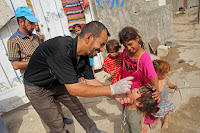The Federal Ministry of Health in coordination with the Kurdistan Region Ministry of Health and with the support of UNICEF and the World Health Organization (WHO), today launched a 12-day campaign to immunize Iraq’s children against polio and measles.
The winter campaign aims to reach some 800,000 children under the age of five living in Iraq’s most vulnerable governorates of Anbar, Salahaddin, Kirkuk, newly retaken areas in Ninewah, and displaced children living in camps in Kurdistan region.
This campaign is part of the vaccination strategy in response to the Mosul Operations. Vaccination teams will be going house to house and tent to tent to ensure that all targeted children are covered. Children below five years will be given polio drops and children aged 9 months to 5 years will be given measles and rubella vaccinations.
“For some of these children, this is the first time they will receive vaccines in two years,” said UNICEF Representative in Iraq Peter Hawkins.
“The Government of Iraq is committed to keeping Iraq polio free and prevent any measles outbreak. It has conducted 20 campaigns to successfully combat the Middle East Polio Outbreak.”
Three nationwide vaccination rounds against polio have already been successfully implemented this year, in February, April and October, in addition to two targeted campaigns against polio and measles in Anbar, and one each in Dabaga Camp and Al-Qayyara.
“The great achievements of protecting children in Iraq from polio has to be maintained through active partnership and collaborative efforts,” said Altaf Musani, WHO Representative in Iraq. “Iraq has endemic transmission of measles and the disease can be fatal particularly in times of crisis. Targeted emergency campaigns in newly retaken areas and IDP camps have helped prevent outbreaks of measles and polio,” he added.
Since April 2014, no new polio cases have been reported in Iraq thanks to the government’s strong commitment and frontline health workers dedication.
Although Iraq was removed from the list of polio-infected countries in May 2015, the risks of a resurgence of polio in Iraq persist due to surveillance and immunization coverage gaps in conflict zones.
UNICEF will provide for the costs of the vaccines, incentives for vaccinators and social mobilization in support of the Federal and Kurdistan Region Ministries of Health, while WHO will cover the transportation costs and campaign monitoring by volunteers of the Iraqi Red Crescent Society. Public health staff from both UNICEF and WHO will support the Departments of Health in supervising and monitoring the campaign.
Zain Telecommunications Company will support the campaign by sending SMSs to reach displaced Iraqis.














0 Comments